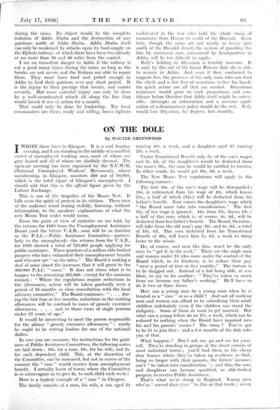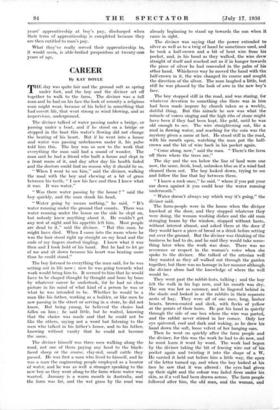ON THE DOLE
By WALTER GREENWOOD
I WRITE these lines in Glasgow. It is a cool Sunday evening, and I am standing in the middle of a smallish crowd of unemployed working men, most of whom are grey haired and all of whom are shabbily dressed. The open-air meeting has been organised by the N.U.W.M. (National Unemployed Workers' Movement), whose membership, in Glasgow, numbers 500 out of 96,000, which is the total figure of Glasgow's unemployed. I should add that this is the official figure given by the Labour Exchange.
This is one of the tragedies of the Means Test. It kills even the spirit of protest in its victims. These men of the audience stood staring stolidly, listening, without interruption; to the speakers' explanations of what the new Means Test scales would mean.
From the point of view of statistics we are told, by the returns for 1935 from the Unemployment Assistance Board (and the letters U.A.B., soon will be as familiar as the P.A.C.—Public Assistance Committee—particu- larly to the unemployed)—the returns from the U.A.B., for 1935 showed a total of 725,000 people applying for public assistance. Three quarters of a million able-bodied paupers who have exhausted their unemployment benefit and who now are " on the rates." The Board is making a deal of noise about the increases that it will grant to the 200,000 P.A.C. " cases." It does not stress what is to happen to the remaining 525,000—except for the ominous remark : " Where the regulations require reductions in the allowances, action will be taken gradually over a period of 18 months, in close consultation with the local advisory committee." The Board continues: " . . . dur- ing the first four or five months, reductions in the existing allowances will be confined to cases of grossly excessive allowances, . . . and to those cases of single persons under 25 years of age."
It would be interesting to meet the person responsible for the phrase " grossly excessive allowances " : surely he ought to be writing leaders for one of the national dailies.
In case you are unaware, the instructions for the guid- ance of Public Assistance Committees, the following scales are laid down : 10s. for a man, 10s. for his wife, and 2s. for each dependent child. This, at the discretion of the Committee, can be increased, but not in excess of the amount the " case " would receive from unemployment benefit. I actually know of towns where the Committee is so extravagant as to give 3s. to each child each week !
Here is a typical example of a " case " in Glasgow.
The family consists of a man, his wife, a son aged 24 earning 40s. a week, and a daughter aged 17 earning 25s. a week.
Under Transitional Benefit only 5s. of the son's wages and 2s. 6d. of the daughter's would be deducted from the man's 26s., the sum he would be entitled to receive. In other words, lie would get 18s. 6d. a week.
The New Means Test regulations will apply in the following manner : The first 16s. of the son's wage will be disregarded : 16s. is subtracted from his wage of 40s. which leaves 24s., a half of which (12s.) will be deducted from his father's benefit. Now comes the daughter's wage which " the Board must take into consideration." The first 12s. of her wage is ignored. 12s. from 25s. leaves 13s. : a half of this sum, which is, of course, 6s. 6d., will be deducted from her father's benefit. The Board, therefore. will take from the old man's pay 12s. and 6s. 6d., a total of 18s. 6d. This sum deducted from his Transitional Benefit of 26s. will leave him 7s. 6d. a week to bring home to the missis.
He, of course, and men like him, won't be the only ones to " get it in the neck." There are the single men and women under 25 who come under the control of the Board which, in its kindness, is to reduce their pay " over a period of four or five months." The torture is to be dragged out. Instead of a lad being able, at oae blow, to say to his mother : " They've taken so much from me because my father's working." He'll have to do it two or three times.
How can a young man be a young man when he is treated as a " case " or as a child ? And not all working men and .women can afford to be subsidising their adult children indefinitely even if the children can stand the indignity. Some of them do want to get married. But what can a young fellow do on 17s. a week, which can be reduced to nothing when the Board have inquired into his and his parents' means ? The army ? You've got to be fit to join that : and a few months of the dole robs you of that.
What happens ? Don't ask me, go and see for your- self. They're standing in groups at the street corners of most industrial towns ; you'll find them in the cheap doss houses where they've taken up residence so that, being no longer with their parents, the latters' incomes can't " be taken into consideration " ; and thus the sons and daughters can become qualified, as able-bodied paupers, to receive Public Assistance.
That's what we're doing in England. Young men who've " served their time " to this or that trade ; seven years' apprenticeship at boy's pay, discharged when their tetra of apprenticeship is completed because they are then entitled to man's pay.
What they've really served their apprenticeship to, it would seem, is able-bodied pauperdom at twenty-one years of age.















































 Previous page
Previous page